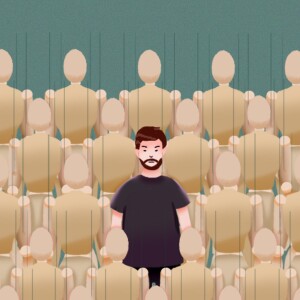
Friday Dec 22, 2023
Aldous Huxley: Exploring the Depths of Human Nature
What is Brave New World book about?
Brave New World is a dystopian novel written by Aldous Huxley and published in 1932. It is set in a futuristic world in which technology and efficiency have taken precedence over individuality and personal freedoms.
The story takes place in London of the year 2540 AD, also known as AF 632 in this future society. The government, known as the World State, has implemented a system that controls every aspect of human life, from reproduction to intelligence and social hierarchy. People are created in laboratories and categorized into different castes based on their predetermined roles in society.
The novel follows the lives of several characters, including Bernard Marx, an Alpha male who feels alienated from his conformist society, Lenina Crowne, a promiscuous Beta female with conflicting desires for monogamy, and John, a "Savage" raised outside of this advanced civilization.
As the plot unfolds, themes such as individual freedom, the dehumanizing effects of technology, the loss of true emotions and relationships, and the dangers of a highly controlled society are explored. The characters' struggles with their desires for personal fulfillment and autonomy lead to a tension-filled climax, in which the dark realities of the World State are revealed.
Overall, Brave New World serves as a cautionary tale, warning against the potential consequences of a society that values efficiency and control above all else, sacrificing individuality, creativity, and authentic human connections in the process.
The author of Brave New World book
The author of Brave New World is Aldous Huxley. He was an English writer and philosopher, born on July 26, 1894, in Godalming, Surrey, England. Huxley came from an intellectual family, with both his father and grandfather being prominent scientists. He was educated at Eton College and later studied English literature at Balliol College, Oxford.
Huxley began his writing career as a novelist, publishing his first book, The Burning Wheel, in 1916. He went on to write numerous novels, essays, and screenplays, covering a wide range of topics including science, philosophy, spirituality, and social criticism.
Brave New World, published in 1932, is one of Huxley's most famous works. It is a dystopian novel set in a futuristic society where individuals are conditioned and manipulated from birth to conform to a strict social order. The book explores themes of individuality, freedom, happiness, and the dangers of an overly controlled society.
Huxley's writing style is often characterized by his use of vivid imagery, satire, and philosophical depth. He was known for his ability to combine literary craftsmanship with thought-provoking ideas, making him one of the most influential writers of the 20th century.
In addition to his work as a writer, Huxley was also interested in spirituality and philosophical inquiry. He experimented with various forms of mysticism and explored the potential for human transcendence. These interests are reflected in some of his later works, such as The Doors of Perception (1954), where he describes his experiences with psychedelic drugs.
Huxley continued to write and publish until his death on November 22, 1963, in Los Angeles, California. He left behind a significant body of work that continues to be celebrated and studied today. Brave New World, in particular, remains an incredibly influential and thought-provoking piece of literature that has sparked countless discussions and debates.
Why is Brave New World book worth reading?
Brave New World is worth reading for several reasons. Firstly, Aldous Huxley's dystopian novel offers a thought-provoking critique of society and its potential consequences. It explores themes such as totalitarianism, the dangers of technological advancement, and the loss of individuality and personal freedom.
The novel presents a vivid and disturbing vision of a future society that has achieved stability and happiness through the suppression of individuality, emotions, and critical thinking. It challenges readers to reflect on the consequences of sacrificing personal freedoms for a harmonious existence.
Additionally, Brave New World raises important ethical questions about the role of science and technology in shaping society. It warns against the potential dangers of allowing such advancements to control and manipulate human life, while also highlighting the importance of human connection and emotional experiences.
The complex characters and their struggles in Brave New World make the story engaging and relatable. The protagonist, Bernard Marx, experiences feelings of alienation and disillusionment with the seemingly perfect society he lives in, making readers question the cost of conformity and the value of individuality.
Furthermore, the novel's narrative style is compelling and immersive, with Huxley's vivid descriptions painting a vivid picture of the society he envisions. It combines elements of science fiction, satire, and philosophical inquiry, making it a rich and multi-layered reading experience.
Overall, Brave New World remains a significant literary work that continues to resonate with readers due to its insightful social commentary, timeless themes, and thought-provoking ideas. It challenges us to critically examine our own society and the potential ramifications of our actions, making it a book that is worth reading and discussing.
No comments yet. Be the first to say something!